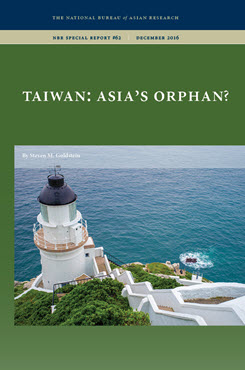NBR Special Report no. 62
Taiwan: Asia's Orphan?
This report analyzes Taiwan’s strategic culture and argues that the island’s perception of its own orphan status is central to how Taiwan defines its place in the international system.
EXECUTIVE SUMMARY
MAIN ARGUMENT
Taiwan’s sense of abandonment in the international system is at the center of its contemporary strategic culture and shapes the strategies intended to secure the island’s interests. The origins of this orphan status can be traced to the U.S. recognition of the People’s Republic of China in 1979, which undermined the domestic and international identity that had prevailed in Taiwan since 1949 and stimulated a democratic movement that contributed to the emergence of a new Taiwan-centric identity. The conditions for the normalization of Sino-U.S. relations are also the principal obstacle to international acceptance of Taiwan’s new identity as the basis for a sovereign nation-state—hence, its orphan status. Paradoxically, even as the terms of Sino-U.S. normalization fostered Taiwan’s sense of abandonment, they also partly ameliorated it by providing areas where the island can secure U.S. support in order to resist Chinese efforts to increase its international isolation (and leave Taiwan no choice but to unify). Thus, for the near future, Taiwan’s orphan status will likely persist.
POLICY IMPLICATIONS
- A fundamental change in the postures of either Taiwan or China on the issue of sovereignty is unlikely in the near future. Thus, Taiwan will face continuing, and possibly intensified, efforts by Beijing to isolate it internationally.
- Taiwan’s leaders will continue to pursue a strategy of avoiding provocations of either the U.S. or China, even as they resist mainland pressures and look to Washington to support their effort to at least maintain Taiwan’s orphan status.
- For its part, the U.S. will be challenged to respond to these expectations in the narrow policy space bounded by its normalization commitments to China and its post-normalization pledges to Taiwan.
Steven M. Goldstein is Director of the Taiwan Studies Workshop and an Associate at the Fairbank Center for Chinese Studies at Harvard University.



